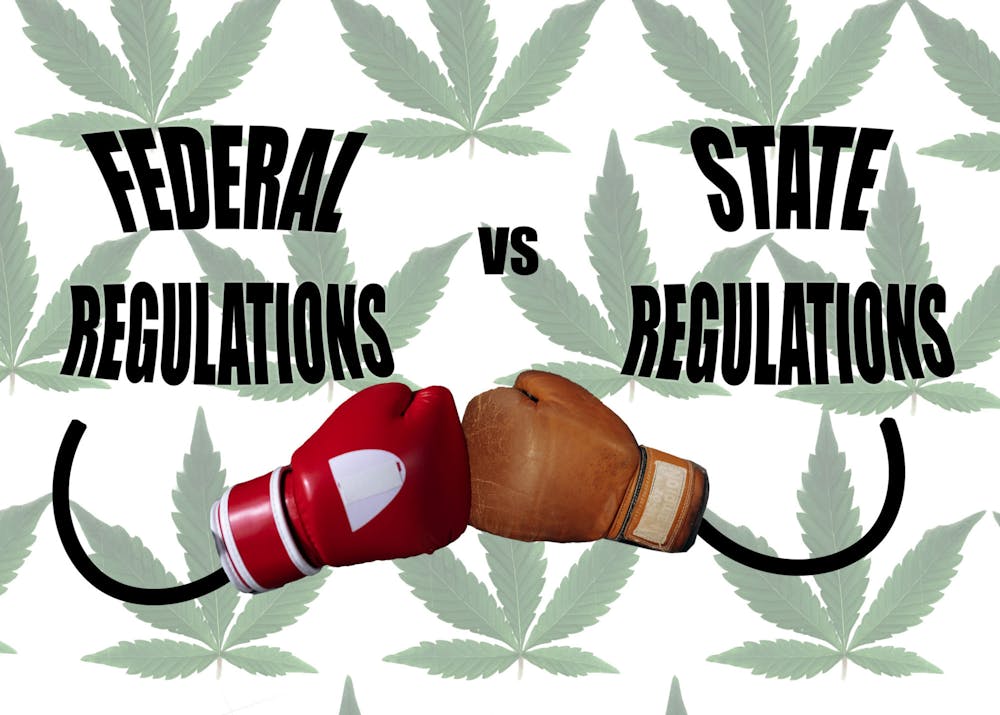State versus federal cannabis regulations
The conversation of cannabis regulations on both the state and federal level has been around for nearly a century. The discussion continues to develop across the United States as cannabis is becoming legalized in some states while also being criminalized in others.
Recently, the Marijuana Opportunity Reinvestment and Expungement (MORE) Act, was reintroduced to the United States Congress for the second time.
"The MORE Act would decriminalize marijuana at the federal level and require courts to expunge (remove completely) prior marijuana-related convictions," according to an email from U.S. Rep Dan Kildee's (D-8) office.
The office representative said it would also “create grant programs to support Americans re-entering the community after serving time in prison for marijuana-related offenses, including job training, mentoring and legal aid.”
According to a U.S. Congress press release, the act was brought forth again by Democratic representatives from Oregon, New York, California and Texas, as well as by a House Judiciary Committee Ranking member from New York.
Prior to the reintroduction this year, the act was successfully passed in the House in Dec. 2020, but shut down by the Senate, according to Bill Track.
So why does marijuana need to be decriminalized at the federal level? Isn't it already legal in Michigan?
In Nov. 2018, Michigan became the 10th state in the United States to legalize recreational cannabis, and the 13th state to legalize medical cannabis, according to U.S. News World Report. The report also states as of Sept. 2023, there are now 23 states in the U.S. that have legalized recreational marijuana.
“In 2018, Michigan voters overwhelmingly supported the initiative to legalize marijuana in the state,” Kildee said in a statement.
What is legal under state law?
While cannabis is legal under Michigan state law, that does not mean everything is acceptable. Like alcohol, smoking marijuana or consuming marijuana-based products for recreational purposes is only legal for those 21 and over. And even for those of age, there are still restrictions.
Officer Jason Haines, public information officer for the Mount Pleasant Police Department, said there are a few key points that students should keep in mind if they are over the age of 21 and using cannabis products. In accordance with Michigan state law:
- Those under the influence of cannabis products cannot operate any motor vehicle;
- Cannabis cannot be smoked or consumed in any public place, unless it is specifically designated for such purposes;
- Michigan residents cannot have more than 2.5 ounces of cannabis in their home unless the excess is locked and stored away.
According to Michigan legislature, there are also several regulations for both recreational and medicinal growers, producers, transporters and distributors of cannabis products.
Some of the regulations include required security measures at businesses that sell cannabis or restrictions on advertising and marketing marijuana products.
What happens if you violate state law?
According to the MPPD arrest numbers for 2022, there were 185 arrests made in Mount Pleasant of drivers operating while impaired (OWI).
Haines said there is no distinction on how many of the cases were cannabis related because the "reporting system does not have the capability of drawing that data." If he were to make an estimate, Haines said there would be more arrests related to driving under the influence of alcohol than cannabis.
Haines explained what a typical OWI arrest looks like. It is composed of three phases:
- Observation: While the individual is driving, do they exhibit any signs of being under the influence, such as swerving their vehicle or driving over the speed limit?
- Contact: Once the individual has been pulled over, do they exhibit any more signs of being under the influence, such as watery or droopy eyes or disorientation?
- Standard Field Sobriety Test (SFST): Can the individual perform a series of tests that have been scientifically proven to show they are not sober, such as walking in a straight line or standing on one leg?
Like any other law, Haines said the consequences of breaking cannabis law depend on to what extent the individual broke the law and if it’s their first violation.
Repercussions for abusing cannabis, like driving under the influence or using products under 21, can include fines, imprisonment and confiscation of the individual’s product.
If students find themselves unable to drive or in a situation with no reliable driver, Haines suggests using Uber or any other taxi company in the Mount Pleasant area.
“Getting arrested and dealing with all the ramifications (of driving under the influence) will make an Uber ride look really cheap,” Haines said.
What is legal under federal law?
While recreational and medical marijuana may be legal in Michigan it is still illegal federally. No matter a person’s age, there is no cannabis product that is federally legal to use, whether in a medical or a recreational sense, according to Haines.
“Technically, any one of these shops in town, they’re in violation of federal law,” Haines said. But because these dispensaries create positive growth for the local economy, Haines said shutting down these shops is not a high priority for federal police.
“Due to the fact that (CMU) accepts federal funding, most commonly in the form of student aid that students receive, (CMU) is required to follow federal regulations,” Haines said.
Haines said that the most important thing students at CMU need to remember when it comes to cannabis is that nothing is allowed while physically on campus.




